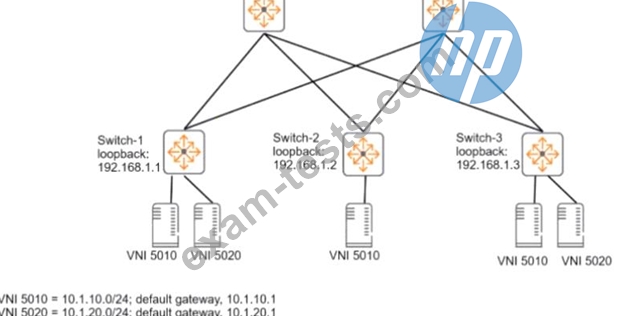Question 21
The architect designs a spine and leaf network for a single data center that will use multiple leaf switches as Virtual Tunnel End Points (VTEP). The architect needs to select the type of Integrated Routing & Bridging (IRB) for the solution.
Is this statement about the IRB type true?
Solution: Asymmetric IRB requires a third L3 VNI to route packets between ingress and egress VTEPs.
Is this statement about the IRB type true?
Solution: Asymmetric IRB requires a third L3 VNI to route packets between ingress and egress VTEPs.
Question 22
Refer to the exhibit.

You need to set up an ArubaOS-CX switch to implement Virtual Extensible LAN (VXLAN) WITHOUT Ethernet VPN (EVPN). The exhibit Indicates which servers should be part of the same VXLANs and the desired VNls for the VXLANs. Assume that the network is already configured to permit each ArubaOS-CX switch to reach each other switch's loopback interface.
Is this part of the process for setting up VXLAN to meet the requirements?
Solution: On Switch-1, set 192.168.1.3 as a peer IP address in the VNI 5020 context.

You need to set up an ArubaOS-CX switch to implement Virtual Extensible LAN (VXLAN) WITHOUT Ethernet VPN (EVPN). The exhibit Indicates which servers should be part of the same VXLANs and the desired VNls for the VXLANs. Assume that the network is already configured to permit each ArubaOS-CX switch to reach each other switch's loopback interface.
Is this part of the process for setting up VXLAN to meet the requirements?
Solution: On Switch-1, set 192.168.1.3 as a peer IP address in the VNI 5020 context.
Question 23
Is this a use case for deploying Ethernet Ring Protection Switching (ERPS)?
Solution: extending Layer 2 communications between data centers that connect over Layer 3 MPLS links
Solution: extending Layer 2 communications between data centers that connect over Layer 3 MPLS links
Question 24
Is this a way that a data center technology can help meet requirements for multi-tenancy?
Solution: Virtual Extensible LAN (VXLAN) enables multiple isolated Layer 3 domains, each with its own routing table, to share a physical network.
Solution: Virtual Extensible LAN (VXLAN) enables multiple isolated Layer 3 domains, each with its own routing table, to share a physical network.
Question 25
Does this correctly describe how Network Analytics Engine (NAE) agents work?
Solution: Agents write data to the switch's current state database.
Solution: Agents write data to the switch's current state database.

